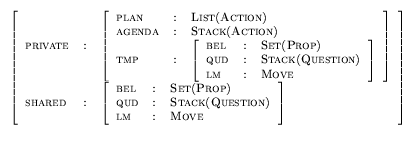
We represent information states of dialogue participants as records
of the following type:

As any abstract datatype, this type of information state is associated with various conditions and operations which can be used to check and update the information state. For example, fstRec(SHARED.QUD,Q) succeeds if Q is unifiable with the topmost element on the shared QUD stack, and popRec(SHARED.QUD) will pop the topmost element off the stack.
The main division in the information state is between information which is private to the agent and that which is shared between the dialogue participants. What we mean by shared information here is that which has been established (i.e. grounded) during the conversation, akin to what Lewis in [Lewis1979] called the ``conversational scoreboard''.
The PLAN field contains a dialogue plan, i.e. is a list of dialogue actions that the agent wishes to carry out. The plan can be changed during the course of the conversation. For example, if a travel agent discovers that his customer wishes to get information about a flight he will adopt a plan to ask her where she wants to go, when she wants to go, what price class she wants and so on. The AGENDA field, on the other hand, contains the short term goals or obligations that the agent has, i.e. what the agent is going to do next. For example, if the other dialogue participant raises a question, then the agent will normally put an action on the agenda to respond to the question. This action may or may not be in the agent's plan.
We have included a field TMP that mirrors the shared fields. This field keeps track of shared information that has not yet been grounded, i.e. confirmed as having been understood by the other dialogue participant*. In this way it is easy to delete information which the agent has ``optimistically'' assumed to have become shared if it should turn out that the other dialogue participant does not understand or accept it. If the agent pursues a cautious rather than an optimistic strategy then information will at first only be placed on TMP until it has been acknowledged by the other dialogue participant whereupon it can be moved from TMP to the appropriate shared field.
The SHARED field is divided into three subfields. One subfield is a set of propositions which the agent assumes for the sake of the conversation. The second subfield is for a stack of questions under discussion (QUD). These are questions that have been raised and are currently under discussion in the dialogue. The third field contains information about the latest move (speaker, move type and content).